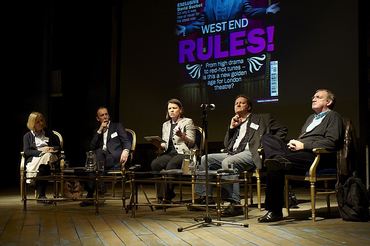Monday afternoon
 The afternoon was devoted to a panel discussing "The Future of the West End" made up of critic Lyn Garner of The Guardian, Jack Bradley from Sonia Friedman Productions and formerly Literary Manager at the National Theatre, Julian Bird, CEO of SOLT and TMA and playwright Richard Bean (most recently of One Man Two Guvnors) and chaired by Dr Karen Fricker (RHUL and a contributor to Variety).
The afternoon was devoted to a panel discussing "The Future of the West End" made up of critic Lyn Garner of The Guardian, Jack Bradley from Sonia Friedman Productions and formerly Literary Manager at the National Theatre, Julian Bird, CEO of SOLT and TMA and playwright Richard Bean (most recently of One Man Two Guvnors) and chaired by Dr Karen Fricker (RHUL and a contributor to Variety).
Sitting beneath an image of a Time Out cover blazoned "West End Rules", they looked first at the claims that the West End has never been so healthy, bringing in half a billion pounds and with new plays leading a theatrical renaissance, though major producers are holding back on new musicals uncertain of the effect of the Olympics. They refered to claims that Hay Fever is not doing as well as expected and that both Shrek and Ghost are being heavily discounted. Could theatre actually be in a period of recession rather than bucking the trend?
Julian Bird reminded that shows need to grow and thought it an advantage that the West End does not publish weekly figures like New York where they can have a very negative effect. Richard Bean dismissed the pessimists—"Theatre is always dying," was his view, "but it won't!"—though if we really want a Panglossian note the best of all possible worlds would be death, a twenty-five year run is death. The nature of theatre is shows come and go. Do you really want to see Phantom 25 times? High turnover allows for change. But the current West End is about a certain kind of theatre, he would like to see his play reach a broader public.
Lyn Gardner saw a disconnection between the West End and what is going on elsewhere. She thought the West End was missing a trick by not catering for a younger, switched-on audience. In fact in a later discussion of Spring Awakening, which had attracted a big young audience at Lyric Hammersmith but died in the West End, they all saw this as deliberate but faulty marketing. Young people flocked to get in during its last few days; this really was the West End getting things wrong.
It was Jack Bradley's view that the West End was much more enterprising before the development of Arts Council funding. It has now abnegated the role of commissioning to subsidised theatre so it can cherry-pick just the work that has money written all over it. But it is usually theatre owners, not producers, who make the money. "On the South Bank, we were part of the West End but we didn't pay rent so our prices could be lower. It's all about equity (Ed: not Equity)."
Cost of seats produced plenty of heat, with Bird in particular wanting some way of controlling touts and online sellers who up prices exponentially. Agencies and others should have to make it clear what the real ticket price is and people should be encouraged to buy them from source. One problem hitting all theatres, not just in London, was the fall in advance booking. People do not book ahead they way they used to which makes it difficult for management. Are people just waiting in the hope of standbys or half-price seats at Tkts? The large outlay on a West End show that disappoints could mean people are put off trying another. People don't go to the cinema and, after seeing a bad film, say never again, they ask what's on next week. Why can't we make them think of theatre like that?
There was discussion of the lack of visiting foreign theatre in London, despite the Barbican's BITE and Thelma Holt's efforts which don't make her money. It was suggested that the British public is not so keen on director-led European theatre.
Newer trends were identified in closer co-operation between the subsidised and commercial sectors with commercial managements investing in the development of work produced in subsidised houses while more recently, as with War Horse and Matilda the subsidised company was running its own commercial production.
There was praise for innovations like The Railway Children at Waterloo Station and Peter Pan in Kensington Gardens and Lyn Gardner suggested more pop up theatres. There was some dissention over the value of live cinema relays of shows, but general support for much more collaboration with the regions, though Richard Bean pointed out that there was plenty of theatre doing very nicely elsewhere, why should they need London. He asked for more women running theatres, which sort of took us back to Jacky Bratton's opening, though his query was why more women didn't put their hands up and say "I want that building!".